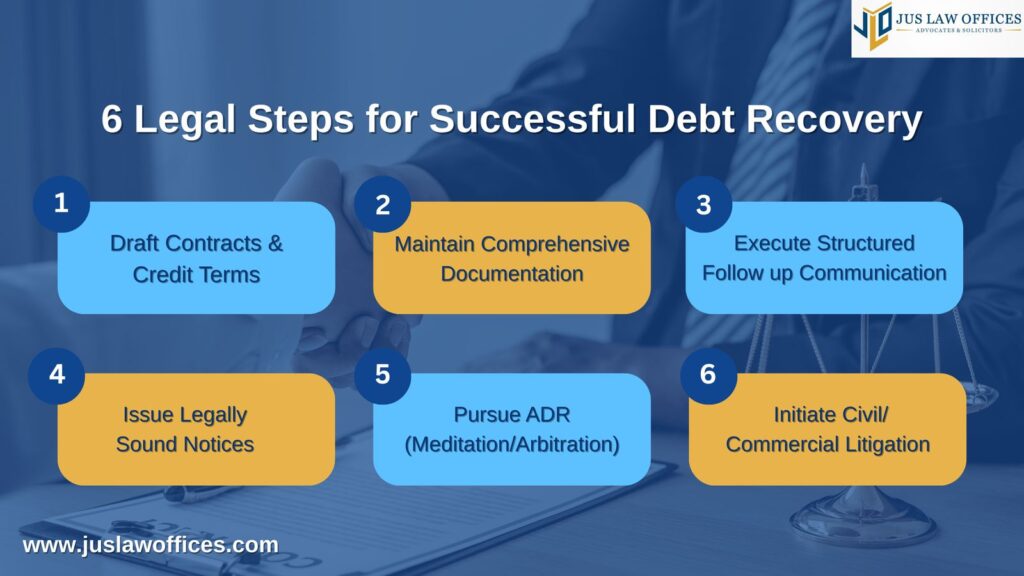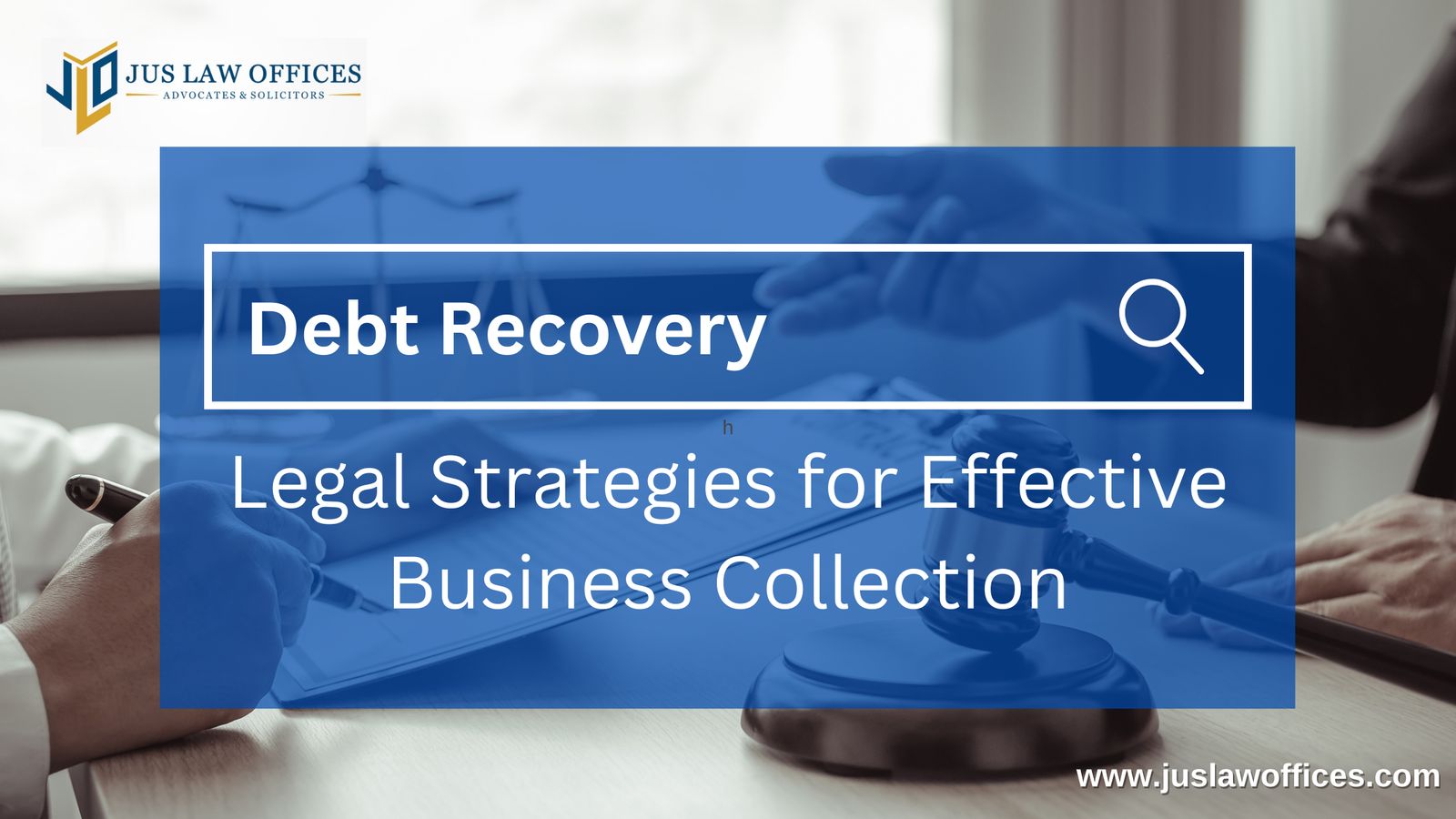Introduction—The Legal Challenge of Recovering Business Debt
Delayed payments can severely disrupt operations and cash flow in competitive markets. While informal methods might seem easier, a legally sound approach is essential to protect your business’s rights and financial health. It is essential to combine legal expertise with practical strategies to ensure that every stage—from pre-litigation measures to courtroom representation—is both effective and enforceable under Indian law.
What Is Debt Recovery and Why Does It Matter?
Debt recovery refers to reclaiming overdue payments from debtors who have not met their financial obligations. It goes beyond simply recovering funds; it protects your business’s credit reputation and liquidity. Without recovery methods, prolonged defaults can lead to operational disruptions and long-term financial instability. Leveraging the expertise of a debt recovery lawyer significantly enhances your chances of reclaiming these funds while mitigating risk.
Understanding the Debt Recovery Process
A structured approach is vital for success. Typical stages include:
- Initial Communication and Reminder Notices:
Begin with informal reminders to prompt payment and document all communication. - Formal Demand Letter:
If initial attempts fail, issue a legal notice that details the outstanding amount, payment deadline, and potential legal consequences. This step reinforces your claim. - Legal Action Initiation:
When informal methods prove ineffective, filing a recovery suit formally starts the legal process. - Court Proceedings:
Present compelling evidence—including contracts, communication records, and delivery confirmations—to justify your claim. - Obtaining a Judgment:
A favorable judgment legally binds the debtor to repay the overdue amount, often with interest and additional costs. - Enforcement:
If the debtor remains non-compliant, enforcement actions such as asset seizure or bank levies may be pursued. - Alternative Dispute Resolution (ADR):
Methods like mediation or arbitration under the Arbitration and Conciliation Act, 1996 can offer quicker and cost-effective resolutions, preserving business relationships.

6 Legal Steps for Successful Debt Recovery
1. Drafting Contracts and Credit Terms
Legal Foundation:
Indian Contract Act, 1872
A strong contractual foundation is crucial. Every commercial transaction should include clear credit terms—detailing payment deadlines, interest on overdue amounts, and dispute resolution clauses.
Illustration:
Imagine ABC Traders in Noida supplying goods to XYZ Pvt Ltd in Delhi. A contract specifying liquidated damages, clear payment terms, and a designated jurisdiction (e.g., “courts in Delhi shall have exclusive jurisdiction”) sets a legal roadmap. In case of default, these provisions enable effective enforcement.
Legal Note:
Contracts that clearly state the consequences of delayed payments are more likely to be upheld, minimizing litigation risks.
2. Maintaining Comprehensive Documentation
Legal Importance:
Thorough documentation—from signed invoices and delivery receipts to email correspondences—is essential evidence in legal disputes.
Illustration:
Consider a Gurgaon-based supplier who, despite delivering quality goods, lacks signed delivery confirmations. Without proper documentation, the supplier’s claim weakens when the client disputes the delivery.
Best Practice:
Adopt digital documentation methods with time-stamped records to ensure every transaction is verifiable in court.
3. Implementing Structured Follow-Up Procedures
Effective debt recovery begins with a clear communication strategy. Start with courteous reminders and gradually escalate your approach.
Legal Perspective:
Consistent, documented follow-up communications demonstrate that you made every effort to settle the matter amicably before pursuing legal recourse—a factor that courts appreciate.
Illustration:
Suhana, a marketing agency owner, follows a schedule of email reminders followed by phone calls. These documented efforts can later serve as evidence before issuing a legal notice.
4. Issuing Legally Sound Notices
Relevant Legal Sections:
- Indian Contract Act, 1872
- Provisions under the Civil Procedure Code (CPC) ) and other Acts for pre-litigation communications
When all informal attempts fail, a formal legal notice is important. It should clearly state the outstanding amount, reference the breach, and warn of impending legal action if the debt remains unpaid.
Illustration:
An IT firm in Gurgaon received a formal legal notice from a law firm, highlighting contractual breaches and associated costs. This prompt compelled the debtor to settle quickly, avoiding further legal complications.
Legal Tip:
Ensure that legal notices are drafted in line with current judicial guidelines to withstand scrutiny in court.
5. Utilizing Mediation and Arbitration for Resolution
Legal Framework:
Arbitration and Conciliation Act, 1996
Mediation and arbitration offer effective alternatives to litigation—especially when both parties seek a quicker, less adversarial resolution. Including an arbitration clause in contracts can significantly reduce time and legal expenses.
Illustration:
A manufacturing unit in Noida invoked an arbitration clause, leading to a mediated settlement that bypassed lengthy court procedures and preserved their business relationship.
Legal Benefit:
Arbitration awards are binding and enforceable, providing a reliable route to secure debt recovery without full-scale litigation.
6. Initiating Civil or Commercial Litigation
Relevant Legal Provisions:
- Order XXXVII of CPC – for summary suits and expedited resolutions
- Commercial Courts Act, 2015 – for higher-value disputes
- MSME Samadhan Portal – for MSME-specific claims
When pre-litigation steps fail, initiating a civil or commercial suit becomes necessary. A well-prepared legal plead, supported by documentation and prior communication, is critical.
Illustration:
A Delhi-based MSME filed a summary suit following repeated defaults. Thanks to solid evidence and a clear contractual breach, the court expedited the case, resulting in a decree within three months.
Legal Insight:
A comprehensive legal strategy that includes pre-litigation measures strengthens your case in court and sends a clear message that legal action is both viable and enforceable.
Drafting an Effective Plaint for Debt Recovery
An effective plaint outlines your claim and demands clearly. It should include:
- Title and Jurisdiction:
Identifying the proper court and establishing jurisdiction. - Parties:
Clearly naming all parties to define the legal relationship. - Statement of Facts:
Providing a clear, chronological narrative of the events leading to the dispute. - Cause of Action:
Explaining the legal grounds for your claim (e.g., breach of contract). - Prayer for Relief:
Articulating the specific relief sought, such as monetary compensation or interest.
Common Pitfalls to Avoid:
- Avoid ambiguity, inaccurate facts, and improper relief claims that might undermine your case.
Laws Related to Debt Recovery
- Indian Contract Act, 1872: Governs the formation and enforcement of contracts.
- Civil Procedure Code (CPC), Order XXXVII: Provides mechanisms for summary suits.
- Arbitration and Conciliation Act, 1996: Supports out-of-court dispute resolution processes.
- Commercial Courts Act, 2015: Facilitates efficient resolution of commercial disputes.
- MSME Development Act, 2006: Enables MSMEs to use specialized legal channels like the MSME Samadhan Portal.
Conclusion – Secure Your Business’s Financial Future with Expert Legal Guidance
Recovering business debt is a complex process that demands both legal expertise and strategic planning. By understanding the recovery process, drafting airtight contracts and plaints, and leveraging professional legal assistance, you can minimize financial risks and ensure timely recovery of overdue payments.
Frequently Asked Questions (FAQs) on Debt Recovery
Q1. How long does the debt recovery process take through legal channels?
Answer: Depending on whether you opt for summary suits or regular litigation. Summary suits and/or Commercial suits, backed by strong
documentation, generally yield faster results.
Q2. Can legal action be taken against debtors outside the Delhi NCR region?
Answer: Yes. If the partial cause of action takes place in Delhi then debt recovery can happen in Delhi.
Q3. Are arbitration awards enforceable in India?
Answer: Absolutely. Under the Arbitration and Conciliation Act, 1996, arbitral awards are binding and enforceable just like a court decree.
Q4. Why is professional legal guidance crucial in debt recovery?
Answer: Legal professionals like ensure compliance with laws, draft effective legal documents, and provide strategic advice that significantly enhances the chances of recovering overdue payments while protecting your business’s financial interests.

